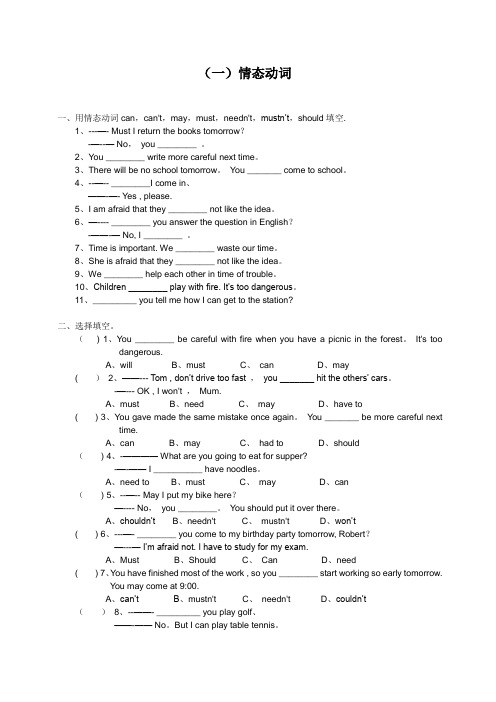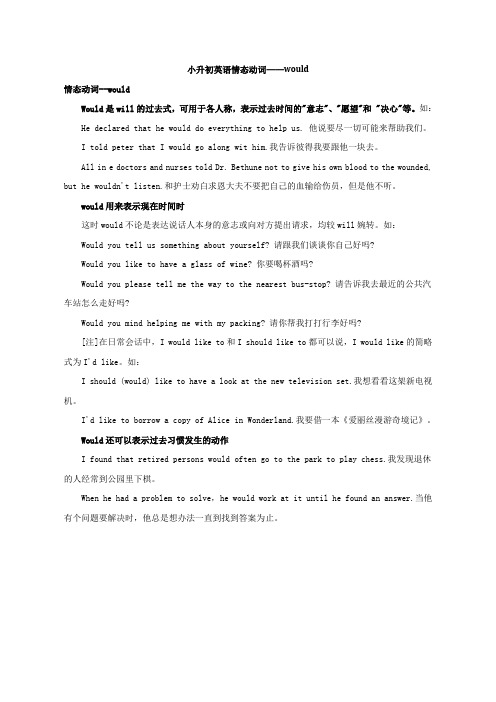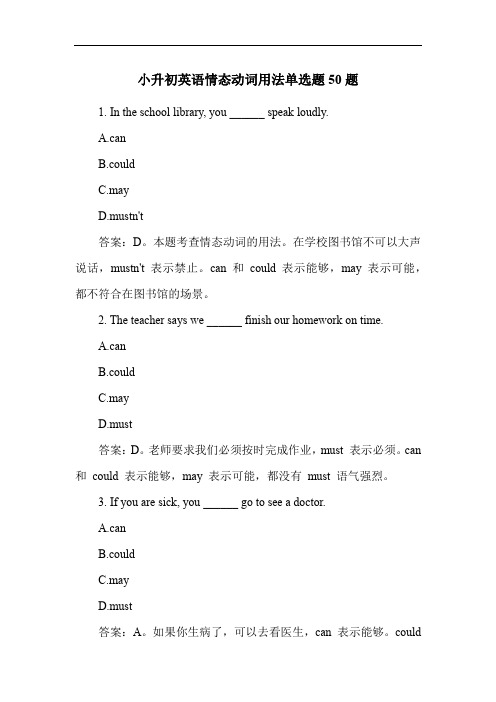小升初英语专项- 情态动词
小升初英语语法情态动词Can引导的一般疑问句

感谢观看
小升初英语语法专题 情态动词Can 引导的一般疑问句
1.Can you run fast? Yes,I can. No, I can't.
Hale Waihona Puke 2.Can he play football well? Yes, he can. No, he can't.
3.Can Lily play basketball well? Yes, she can. No, she can't.
X
如何把陈述句变成一般疑问句
Tom can swim.
Can Tom swim?
如何把陈述句变成一般疑问句
They can sing English songs.
Can they sing English songs?
如何把陈述句变成一般疑问句
I can wash the clothes.
Can you wash the clothes?
2.We can speak English. 改为一般疑问句:Can you speak English? 肯定回答: Yes, we can. 否定回答: No, we can't.
3.The horse can run very fast.
改为一般疑问句: Can the horse run very fast? 肯定回答: Yes, it can. 否定回答: No, it can't.
句子结构:Can +主语+动词原形+其它? 肯定回答:Yes, 主语+can. 否定回答:No, 主语+can't. 注意:主语一般为人称代词;一二人称要互换。
Can they skip?
小升初英语情态动词练习题及答案及解析

2.To my joy, we_________ go to the bank. Mary has lent us some money.
A.shouldn’tB.needn’tC.couldn’tD.wouldn’t
—No, you ________. Don’t you see the light is still red?
A.couldn’tB.wouldn’tC.mustn’tD.needn’t
5.—The high school entrance examination is coming!
— Yes, our teacher tells us we ________ be too careful while taking exams.
—Nothing________be better.
A.shouldB.couldC.mustD.may
18.— Ready? Let’s get started, Martin.
— Swimming? I just ________ get used to it in winter.
8.Our Chemistry teacher always tells us we ________ be too hardworking before the exams.
A.mustn’tB.shouldn’tC.needn’tD.can’t
9.—Is it really necessary for me to go shopping with a mask on?
—Oh. You ________. He has known it already.
小升初常见情态动词用法归纳

小升初常见情态动词用法归纳情态动词是英语中一个重要的语法概念,它用来表示说话人对某个动作或状态的态度、推测、命令、许可等。
了解和正确运用常见情态动词的用法对于学习英语至关重要。
在小升初考试中,情态动词的应用也是一个重要的考点。
本文将归纳总结小升初常见情态动词的基本用法,帮助同学们更好地掌握和运用。
一、can/could1. 表示能力和技能:- can表示现在或将来的能力,could表示过去的能力。
- can和could在肯定句中用来表达能力、掌握程度、技能等。
例如:I can swim.(我会游泳。
)2. 表示许可与请求:- can表示直接的许可,could表示委婉的许可。
- can和could在疑问句中用来提出请求或询问是否有许可。
例如:Can I go to the washroom?(我可以去洗手间吗?)3. 表示可能性:- can和could用来表示某种可能性。
- can表示一般的可能性,could表示一种更加虚拟的可能性。
例如:It can be true.(可能是真的。
)二、may/might1. 表示推测和猜测:- may和might用来表示对某种情况的推测和猜测。
- may表示一种更有把握的可能性,might表示一种更加不确定的可能性。
例如:He may be late.(他可能会晚到。
)2. 表示许可与请求:- may表示正式的许可,might表示委婉的许可。
- may和might在疑问句中用来提出请求或询问是否有许可。
例如:May I use your pen?(我可以用你的笔吗?)三、must1. 表示推测和肯定:- must用来表示对某种情况的推测和肯定。
- must表示说话人的判断或逻辑上的必然。
- must在疑问句中表示对应对方的情况感到惊异或不解。
例如:You must be tired.(你一定很累。
)2. 表示义务和必须:- must表示说话人的认定,有一种应当的意味。
(一)小升初备考情态动词

(一)情态动词一、用情态动词can,can't,may,must,needn't,mustn’t,should填空.1、---—- Must I return the books tomorrow?-—--— No,you ________ 。
2、You ________ write more careful next time。
3、There will be no school tomorrow。
You _______ come to school。
4、--—-- ________I come in、——-—- Yes , please.5、I am afraid that they ________ not like the idea。
6、—---- ________ you answer the question in English?-——-— No, I ________ 。
7、Time is important. We ________ waste our time。
8、She is afraid that they ________ not like the idea。
9、We ________ help each other in time of trouble。
10、Children ________ play with fire. It’s too dangerous。
11、_________ you tell me how I can get to the station?二、选择填空。
() 1、You ________ be careful with fire when you have a picnic in the forest。
It's too dangerous.A、willB、mustC、canD、may( )2、——--- Tom , don’t drive too fast ,you _______ hit the others’ cars。
小升初英语情态动词should

小升初英语情态动词——shouldShould表示"劝告"、 "建议 "时这时should常译作 "应当"。
如:We Should learn about the computer and make full use of it.我们应该了解计算机并加以充分利用。
You should listen to the doctor's advice.你应当听大夫的话。
You should study the article care fully. 你应当细,心学习这篇文章。
should还可以表示 "预测"、"可能"They should be here by now.他们现在可能到了。
The reference book should be in the reading-room.这本参考书可能在阅览室里。
should有时表示说话人的感情如惊奇、愤怒、失望等Why should I go? 我干吗要去?(不满)I am sorry that he Should be so obstinate.我很遗憾,他竟这样固执。
(失望)It's strange that it should be so hot today.很怪,今天怎么这么热。
(惊奇)should后跟动词的完成式时这时句子指的是过去的事情。
如果是肯定句,常说明某件事本应完成而未完成;如果是否定句,表示发生了不应当发生的事情。
如:You should have stopped at in red light. 你见了红灯本应该停车。
You Should not have gone back to work without the doctor's permission.你不应当未经医生许可就回去工作。
He Should have come earlier. 他应早一点来。
小升初英语情态动词用法

小升初英语情态动词用法情态动词是英语中一种特殊的动词形式,用于表示说话者对某种行为的看法、态度或意愿等。
在小升初英语考试中,情态动词用法是一个重要的考点。
本文将详细介绍小升初英语中常用的情态动词及其用法。
一、can的用法1. 表示能力:can表示某人具有的能力或技能,例如:- I can swim.(我会游泳。
)- She can play the piano.(她会弹钢琴。
)2. 表示许可:can用于表达允许或许可,例如:- Can I go to the park?(我可以去公园吗?)- You can take a break now.(你可以休息一下。
)3. 表示可能:can用于表达可能性,例如:- It can rain tomorrow.(明天可能会下雨。
)- He can be late for the meeting.(他可能会迟到会议。
)二、could的用法1. 表示过去的能力:could用于表示过去具有的能力或技能,例如:- When I was young, I could climb trees.(我小时候会爬树。
)- My grandma could speak three languages.(我的奶奶会说三种语言。
)2. 表示过去的许可:could可用于表示过去的许可,例如:- Could I use your phone yesterday?(昨天我可以用你的电话吗?) - She asked if she could borrow my book.(她问我是否可以借我的书。
)3. 表示礼貌的请求:could可用于礼貌地请求或询问,例如:- Could you please help me with my homework?(你能帮我做作业吗?)- Could I ask you a question?(我能问个问题吗?)三、may的用法1. 表示许可:may用于正式场合表示允许或许可,尤其常用于书面语,例如:- May I have a glass of water, please?(请问我可以要一杯水吗?) - Students may not leave the classroom during the exam.(考试期间学生不能离开教室。
小升初英语情态动词would专项讲解习题

小升初英语情态动词——would情态动词--wouldWould是will的过去式,可用于各人称,表示过去时间的"意志"、"愿望"和 "决心"等。
如:He declared that he would do everything to help us. 他说要尽一切可能来帮助我们。
I told peter that I would go along wit him.我告诉彼得我要跟他一块去。
All in e doctors and nurses told Dr. Bethune not to give his own blood to the wounded, but he wouldn't listen.和护士劝白求恩大夫不要把自己的血输给伤员,但是他不听。
would用来表示现在时间时这时would不论是表达说话人本身的意志或向对方提出请求,均较will婉转。
如:Would you tell us something about yourself? 请跟我们谈谈你自己好吗?Would you like to have a glass of wine? 你要喝杯酒吗?Would you please tell me the way to the nearest bus-stop? 请告诉我去最近的公共汽车站怎么走好吗?Would you mind helping me with my packing? 请你帮我打打行李好吗?[注]在日常会话中,I would like to和I should like to都可以说,I would like的简略式为I'd like。
如:I should (would) like to have a look at the new television set.我想看看这架新电视机。
I'd like to borrow a copy of Alice in Wonderland.我要借一本《爱丽丝漫游奇境记》。
小升初英语情态动词用法单选题50题

小升初英语情态动词用法单选题50题1. In the school library, you ______ speak loudly.A.canB.couldC.mayD.mustn't答案:D。
本题考查情态动词的用法。
在学校图书馆不可以大声说话,mustn't 表示禁止。
can 和could 表示能够,may 表示可能,都不符合在图书馆的场景。
2. The teacher says we ______ finish our homework on time.A.canB.couldC.mayD.must答案:D。
老师要求我们必须按时完成作业,must 表示必须。
can 和could 表示能够,may 表示可能,都没有must 语气强烈。
3. If you are sick, you ______ go to see a doctor.A.canB.couldC.mayD.must答案:A。
如果你生病了,可以去看医生,can 表示能够。
could语气更委婉,may 表示可能,must 表示必须,这里用can 最合适。
4. You ______ borrow books from the school library if you have a library card.A.canB.couldC.mayD.might答案:A。
如果你有图书卡,你可以从学校图书馆借书,can 表示能够。
could、might 语气更委婉,may 也表示可能,但can 更符合这里的语境。
5. We ______ run in the corridor. It's dangerous.A.canB.couldC.mayD.mustn't答案:D。
我们不可以在走廊里跑,很危险,mustn't 表示禁止。
can 和could 表示能够,may 表示可能,都不符合这里的要求。
6. You ______ bring your own water bottle to school.A.canB.couldC.mayD.must答案:A。
- 1、下载文档前请自行甄别文档内容的完整性,平台不提供额外的编辑、内容补充、找答案等附加服务。
- 2、"仅部分预览"的文档,不可在线预览部分如存在完整性等问题,可反馈申请退款(可完整预览的文档不适用该条件!)。
- 3、如文档侵犯您的权益,请联系客服反馈,我们会尽快为您处理(人工客服工作时间:9:00-18:30)。
动词精讲(第五讲)二:
用法及主要句型
三、 must, have to
1) 表示必须、必要。 You must come in time.
在回答引出的问句时,如果是否定的,不能用mustn’t(禁止,不准), 而用needn’t, don’t have to(不必).
---- Must we hand in our exercise books today? ---- Yes, you must. ---- No, you don’t have to / you needn’t. 2) must是说话人的主观看法, 而have to则强调客观需要。 Must只有一般现在时, have to 有更多的时态形式。 1. he play isn’t interesting, I really must go now. 2. I had to work when I was your age. 3) 表示推测、可能性(只用于肯定的陈述句) 1. You’re Tom’s good friend, so you must know what he likes best. 2. Your mother must be waiting for you now.
一、单项选择。
动词精讲:复习
()1.我在照看孩子. (A)I am looking after the baby.(B)I'm look aftering the baby. (C)I look am aftering the baby.(D)I looking after the baby. ( )2. Look! The twins _____their mother do the housework. (A)are wanting (B)help(C)are helping (D)are looking ( )3.你在干什么? (A)What is you doing? (B)What are you do? (C)What are you doing? (D)What do you ( )4._____are the birds doing? They are singing in a tree. (A)Who (B)What (C)How (D)Where ( )5. 11.Listen! She ____ in the classroom. (A)is singing (B)sing (C)to sing (D)is sing ( )6.The children _____ football now. (A)is playing (B)are playing (C)play the (D)play a ( )7.They are flying kites. (A)他们喜欢放风筝 (B)他们在放风筝吗? (C)他们在放风筝 (D)他们常放风筝
常见。 2)用于祈使句,表示祝愿。
May you succeed! 3) 表示推测、可能性(不用于疑问句)。 might不是过去式,它所表示的可能性比may小。 1.He may /might be very busy now. 2.Your mother may /might not know the truth.
1) 表示能力(体力、知识、技能)。 Can you lift this heavy box?(体力) Mary can speak three languages.(知识) Can you skate?(技能) Can只有一般现在时和一般过去式; 2) 表示请求和允许。 -----Can I go now? ----- Yes, you can. / No, you can’t. 3) 表示客观可能性(客观原因形成的能力)。 They’ve changed the timetable, so we can go by bus instead. This hall can hold 500 people at least. 4) 表示推测(惊讶、怀疑、不相信的态度),用于疑问句、否定句和感叹句中 Can this be true? This can’t be done by him. How can this be true?
:Yoyo老师
动词精讲:复习
现在进行时: 主语 + 相应be动词 + 动词ing
动词变ing:变化规则 1.直接+ ing(例:sleep+ing=sleeping) 2.去掉不发音的e+ing(例:bite-e+ing=biting) 3.重读闭音节,以元音字母加辅音字母结尾的词, 要双写尾字母再加ing (例:swim+m+ing=swimming)travel除外 4.以ie结尾的重读闭音节,变ie为y+ing (3个:die-dying lie-lying tie―tying) 5结尾为c且c读作/k/时,在结尾加k再加ing (例:picnic-picnicking)
动词精讲(第五讲)二:
用法及主要句型
二、 may, might
1) 表示请求和允许。might比 may语气更委婉,而不是过去式。否定回 答时可用can’t 或mustn’t,表示“不可以,禁止”。 ----Might/ May I smoke in this room? ---- No, you mustn’t. ---- May/Might I take this book out of the room? ---- Yes, you can. (No, you can’t / mustn’t. ) 用May I...?征徇对方许可时比较正式和客气,而用Can I...?在口语中更
3
动词精讲(第五讲)一 :情态动词
定义: 情态动词有词义,不能单独使用,它必须和其他动 词一起构成谓语。它的后面必须跟动词原形 情态动词没有人称和数的变化; 其否定形式是在情态动词的后面加not。
4
动词精讲(第五讲)二:种类
小学阶段需掌握的情态动词
5
动词精讲(第五讲)二:
用法及主要句型
一、 can, (could 过去式)
